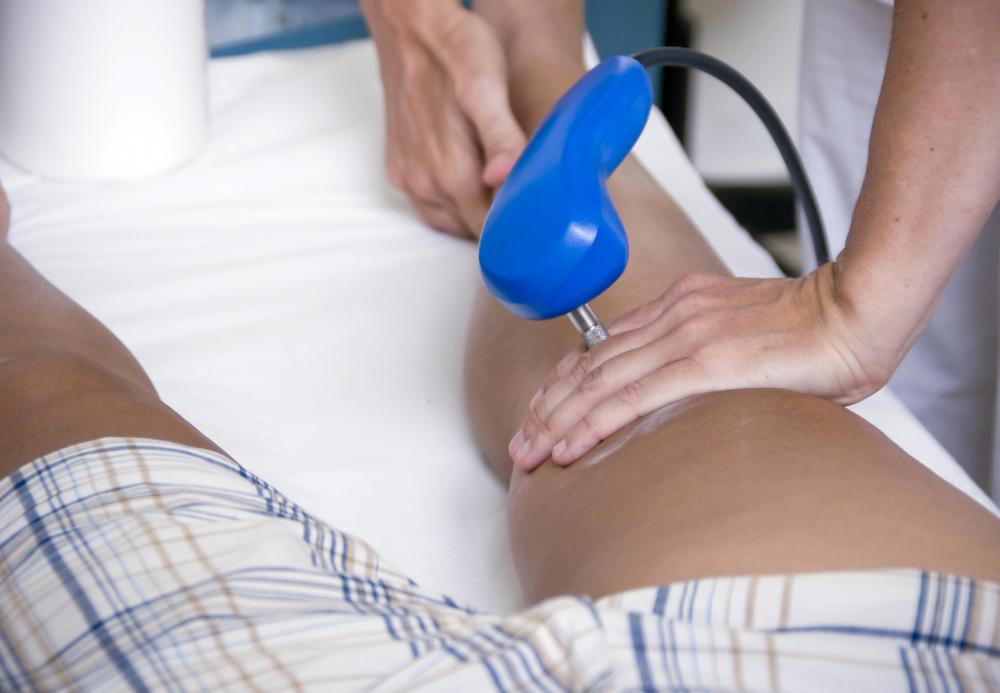At WiseGEEK, we're committed to delivering accurate, trustworthy information. Our expert-authored content is rigorously fact-checked and sourced from credible authorities. Discover how we uphold the highest standards in providing you with reliable knowledge.
How can I Deal with Gout Pain?
Gout pain can be extremely debilitating for sufferers, but there are a variety of methods they can use to control it. Pain medications and other drugs for treating gout are good temporary treatments for managing pain. Alternate treatments including icing and heating of the affected joint, and laser therapy can also be useful. Dietary changes, both adding certain foods and removing others, can be helpful not only for short-term pain relief but for overall reduction in gout attacks.
Medication is often necessary to deal with gout pain until the underlying cause can be addressed. Over-the-counter pain relievers such as NSAIDs may be effective in managing pain, though stronger, prescription strength drugs may be necessary for extreme pain. Anti-inflammatory drugs such as indomethacin and colchicine may also be prescribed. One drug which should be avoided is aspirin, as it can worsen the symptoms of gout.

Sufferers can also cope with gout pain in the short term by alternately applying heat and cold to the joint. Holding an ice pack over the joint for short periods can reduce swelling and ease pain. Between these treatments, application of heat is often helpful. Wrapping the joint to keep it warm, or applying a heat source like a heating pad, can be soothing.

Another alternative treatment for gout pain is laser therapy. Some studies have shown that low level laser treatment, or cold laser therapy, can reduce the swelling and inflammation caused by gout which lead to pain. Patients given this treatment experienced rapid reduction of their pain after treatment.
Perhaps the most important treatment of gout and gout pain involves dietary changes. Many types of food contribute to the buildup of uric acid in the body, which in turn leads to the formation of crystals in the joint fluid which cause gout. Removing or reducing these foods in one's diet is critical for relieving gout pain and eventually stopping it completely. Red meat, fatty fish and shellfish, and eggs all contribute to gout. Sugary drinks, caffeine, and alcohol should also be avoided.

Adding certain foods to one's diet can also be helpful. Eating cherries or drinking cherry juice is known to be very effective for quickly reducing gout pain. Low-fat milk and yogurt can also help. Several foods have properties which may decrease uric acid levels in the body, including dark berries, coffee, and olive oil.
AS FEATURED ON:
AS FEATURED ON:



















Discussion Comments
Has anyone tried over-the-counter stomach medications like a proton pump inhibitor for gout joint pain? Someone told me that it works, but I find it hard to believe. I'm guessing that this too has to do with acidity levels in the body.
For now, I'm resting and taking pain relievers. Standing for too long and wearing tight shoes makes my gout worse so I avoid both.
@ddljohn-- Are you taking a medication for gout, to reduce uric acid levels in your body? You need to see your doctor about this if you weren't given prescription medications to treat the condition.
There are natural remedies for gout but they're not proven. Apple cider vinegar and baking soda are two that I know of. They work better for some than others, but you might want to give them a try. It will be too much to try both, so try them separately.
You can take half a tablespoon of baking soda mixed in water, four times a day or a tablespoon of vinegar in water once a day. You can add honey to the vinegar and water mixture. Both baking soda and vinegar reduce acidity in the body and can reduce uric acid levels and provide gout pain relief.
Are there any natural gout pain remedies?
I just had another gout attack yesterday and I'm in immense pain. I've taken an anti-inflammatory pain reliever, but it hasn't made much of a difference.
Post your comments